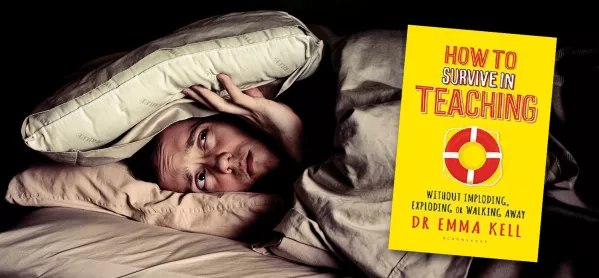- Home
- Book review: How to Survive in Teaching
Book review: How to Survive in Teaching

I wish I’d had How to Survive in Teaching on my bedside table when I was considering leaving both my school and the profession in 2015. Emma Kell presents a digestible summary of how it’s been, how it is and how we can all survive this thing called “teaching”.
There are a couple of things that really stand out. The first is the body of research, put together by Kell and upon which the book is based. Although, yes, it offers few surprises, it acts as an excellent reference point for the would-be educational policymaker. Excerpts from her interviews with 3,700 professionals add some specific context to the wider themes.
The second is that Kell’s teacher self comes through, too. It is one that is confident and assured - while still maintaining the honesty and humility that make you want to listen.
Kell doesn’t pull any punches when it comes to what she believes is happening and should be happening in England’s schools. With 20 years’ experience in various inner-city schools, her acute understanding of what’s happening on the ground is obvious throughout.
Shocking tales
Part 1, “Teaching in crisis”, ends with Kell saying “this chapter has been with me day and night for around five weeks now. I’ve ranted and raged at the stories of inhumanity that have come my way and the sheer waste of talented people walking away”.
She highlights several shocking tales, including the teacher who felt under pressure to remain in school despite experiencing a miscarriage, teachers whose books were monitored while they were off sick and the teacher told off for leaving their duty spot because they were desperate for the toilet.
I found myself nodding along to the section entitled “Presenteeism: they locked me in”, where Kell describes as a “scourge” of teaching the “infectious compulsion to be seen in work beyond hours that are conducive to health”. Here, she opens up about one of her “biggest mistakes” - when she overloaded a member of her team with extra responsibilities that led to their suffering a “temporary burnout”. I found this honesty refreshing. She concludes with the warning: “The system can end up burning through the very people who give us hope for the future.”
The section entitled “Why teach?” is short but sweet, offering a celebration of the reasons why teachers take the leap.
The third chapter is almost a state of the union address - a summary of what life is like in schools today. It will prove incredibly useful to anyone considering going into the profession, outlining what to expect and also the views of parents and students on what they expect from their teachers.
Having written extensively on Ofsted and teacher accountability over the last few years, I found Kell’s comments in this chapter interesting. Her argument is that teachers and schools should undergo regular scrutiny - and therefore the inspectorate’s existence is essential as an independent agency, to know what’s going on. She argues that Ofsted has “changed - dramatically and infinitely for the better” and that her research has led her to conclude that its “approach is now fair and reasonable”.
Although I agree the approach has evolved, I disagree that it’s now fair and reasonable. The current “outcomes above everything” stance continues to imply that teachers influence the results of the students in the classroom and at a whole-school level much more than they do. Despite this, the sincerity and directness with which she presents her arguments is excellent.
How to respond
Chapter four is probably my favourite. It refers back to the challenges to the profession outlined at the beginning of the book and offers a response to each. I enjoyed the proposed response to curriculum and assessment changes - “don’t take it lying down”, where she quotes Association of School and College Leaders general secretary Geoff Barton saying that teachers should “rage more” and say no.
The final part of the book brings together some of the best strategies for “turning the page and moving forward”. Kell concludes: “For all the grey hairs and overflowing inboxes, as long as there’s at least one reason to feel optimistic on arriving at the school gates in the morning, it’s worth it.”
I thoroughly enjoyed this book. Kell uses her experience to offer hard-hitting advice, commentary and analysis. I’ll be dipping into it regularly as a middle leader and recommending it to anyone considering venturing into this most noble profession.
Thomas Rogers is a teacher who runs rogershistory.com and tweets @RogersHistory
Keep reading for just £1 per month
You've reached your limit of free articles this month. Subscribe for £1 per month for three months and get:
- Unlimited access to all Tes magazine content
- Exclusive subscriber-only stories
- Award-winning email newsletters



